Taking Culture Beyond Borders
In a year that celebrated the longstanding cultural ties between Qatar and the US, a Qatar Foundation (QF) member that encourages young people to think freely, question openly, and look at the world with a critical eye took the art of Arabic debating to the heart of America.
QatarDebate is the national debating organization of Qatar, spreading the culture of discourse and dialogue within Qatar, across the Arab world, and beyond. And in the Qatar-USA 2021 Year of Culture, the center strengthened its ties, and those of QF and Qatar, with American institutions.
The summer of 2021 saw the launch of the QatarDebate Majlis in Western Kentucky University (WKU) in the US, with the university’s Associate Provost for Global Learning and International Affairs describing it as “home – the place where we will always have these conversations where we will always learn from each other, where we will always solve some of the problems of the world.”
In a year that celebrated the longstanding cultural ties between Qatar and the US, a Qatar Foundation (QF) member that encourages young people to think freely, question openly, and look at the world with a critical eye took the art of Arabic debating to the heart of America.
QatarDebate is the national debating organization of Qatar, spreading the culture of discourse and dialogue within Qatar, across the Arab world, and beyond. And in the Qatar-USA 2021 Year of Culture, the center strengthened its ties, and those of QF and Qatar, with American institutions.
The summer of 2021 saw the launch of the QatarDebate Majlis in Western Kentucky University (WKU) in the US, with the university’s Associate Provost for Global Learning and International Affairs describing it as “home – the place where we will always have these conversations where we will always learn from each other, where we will always solve some of the problems of the world.”
Conversations, connections, and cross-cultural understanding continue to be formed between QF and its partners around the globe – reflecting the power of dialogue in building a closer, more unified world.
QatarDebate spreads the culture of debate and dialogue in
- The US
- Europe
- East Asia
- Kuwait
- Oman
- Sudan
- Jordan
- Northwest Africa
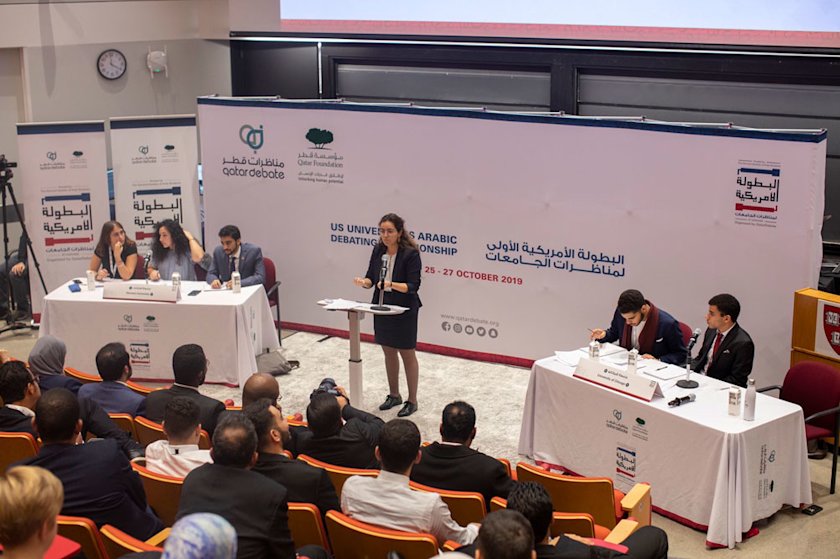
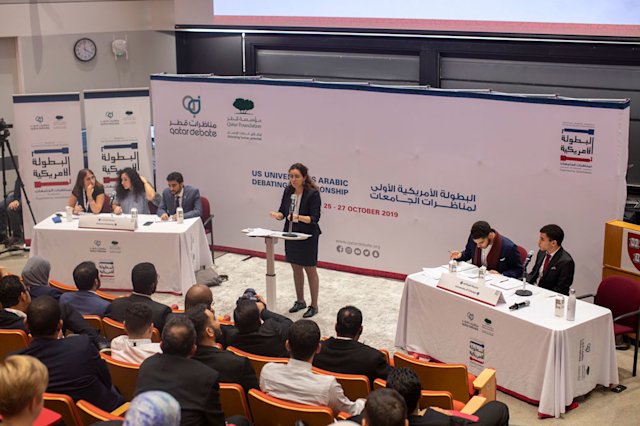
Bonds of Knowledge
The Majlis at WKU is a free space for Arabic language students and teachers, and Arabic debate students, to connect and debate, and QatarDebate’s Outreach Programs Manager Abdulrahman Al-Subaie said: “It is a meeting place for the debate community and the Arabic language community in America, and introducing the Qatari culture to them.”
QatarDebate’s bonds with WKU, which stretch back several years, aim to spread the culture of Arabic debate and discussion at the university and in the US. The QF member has formed collaborations with WKU and three other American educational institutions to deliver courses that teach Arabic language learners debate skills.
“Our activities in the US provide an open platform for discussion and exchange of knowledge about Arab and global issues,” said Dr. Hayat Abdullah Maarafi, Executive Director, QatarDebate.
“QatarDebate is proud of what it is achieving in the US. Our members work hard, and with faith, to continue carrying the torch of Qatar to light the paths of the future generations who are eager to learn the Arabic language, and learn about the history and present of Arab civilization.”
The Majlis at WKU is a free space for Arabic language students and teachers, and Arabic debate students, to connect and debate, and QatarDebate’s Outreach Programs Manager Abdulrahman Al-Subaie said: “It is a meeting place for the debate community and the Arabic language community in America, and introducing the Qatari culture to them.”
QatarDebate’s bonds with WKU, which stretch back several years, aim to spread the culture of Arabic debate and discussion at the university and in the US. The QF member has formed collaborations with WKU and three other American educational institutions to deliver courses that teach Arabic language learners debate skills.
“Our activities in the US provide an open platform for discussion and exchange of knowledge about Arab and global issues,” said Dr. Hayat Abdullah Maarafi, Executive Director, QatarDebate.
“QatarDebate is proud of what it is achieving in the US. Our members work hard, and with faith, to continue carrying the torch of Qatar to light the paths of the future generations who are eager to learn the Arabic language, and learn about the history and present of Arab civilization.”
Our activities in the US provide an open platform for discussion and exchange of knowledge about Arab and global issues
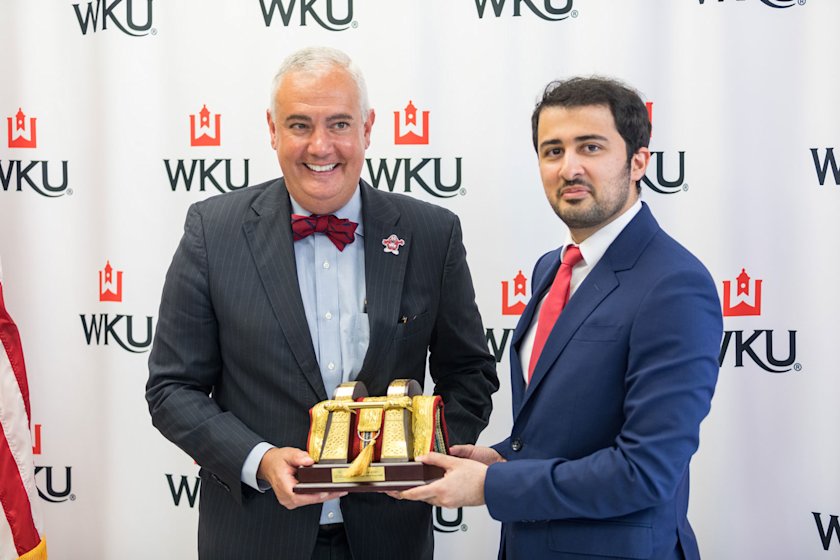
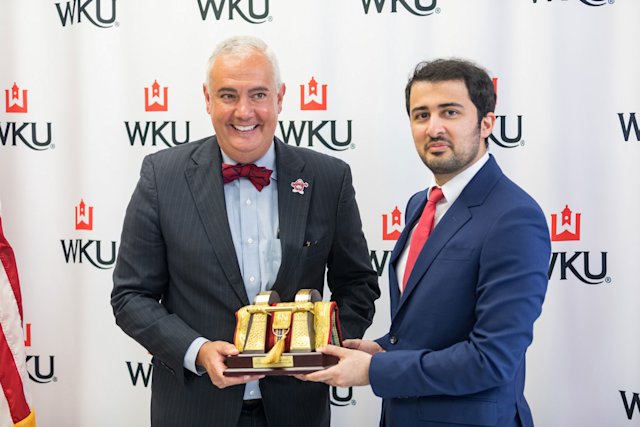
Voices for Change
Fostering dialogue is also the goal of QF’s Education City Speaker Series, and as Palestinians intensified their stand against Israeli occupation, the platform explored how their voices can be amplified.
Speakers from Palestine and beyond shared their views on the barriers that stand in the way of the Palestinian struggle being understood around the world, in the wake of the forced eviction of residents of occupied East Jerusalem’s Sheikh Jarrah neighborhood and the renewed Israeli bombardment of Gaza.
They included Palestine Youth Orchestra member Mariam Afifi, whose smile of defiance while being arrested by Israeli police during the Sheikh Jarrah forced evictions made headlines around the world. And she said: “There is a feeling things are changing, that a difference is being made.
“Media coverage of Sheikh Jarrah, and the use of social media, has opened the eyes of Palestinians and people internationally. Keep talking about Palestine. Keep posting about Palestine. If people talking about Palestine on social media wasn’t powerful, people wouldn’t try to censor us.”
Fostering dialogue is also the goal of QF’s Education City Speaker Series, and as Palestinians intensified their stand against Israeli occupation, the platform explored how their voices can be amplified.
Speakers from Palestine and beyond shared their views on the barriers that stand in the way of the Palestinian struggle being understood around the world, in the wake of the forced eviction of residents of occupied East Jerusalem’s Sheikh Jarrah neighborhood and the renewed Israeli bombardment of Gaza.
They included Palestine Youth Orchestra member Mariam Afifi, whose smile of defiance while being arrested by Israeli police during the Sheikh Jarrah forced evictions made headlines around the world. And she said: “There is a feeling things are changing, that a difference is being made.
“Media coverage of Sheikh Jarrah, and the use of social media, has opened the eyes of Palestinians and people internationally. Keep talking about Palestine. Keep posting about Palestine. If people talking about Palestine on social media wasn’t powerful, people wouldn’t try to censor us.”
If people talking about Palestine on social media wasn’t powerful, people wouldn’t try to censor us
Driving Global Research
A single, urgent question united thousands of scientists around the world when the true scale of the COVID-19 pandemic became clear: which genetic factors influence how severely patients are affected by the virus?
In July, their findings to date were published in Nature – the world’s leading multidisciplinary science journal – and revealed 13 locations in the human genome that are strongly associated with infection or severe COVID-19. Obtained through one of largest genome-wide association studies ever performed, spanning 25 countries, the results could help the development of future therapies for infectious disease.
Qatar Foundation Research, Development and Innovation’s Qatar Genome Programme (QGP) was the only institution in the Arab world to contribute to this global scientific quest, the COVID-19 Host Genetics Initiative, in the form of more than 13,000 genomes from Qatar.
“We were prepared to join the consortium because we knew how important it is to represent Middle Eastern and Arab genomes in such studies, to enhance diversity and empower genetic discoveries and avoid being absent from such key global efforts,” said QGP Director Dr. Said Ismail.
A single, urgent question united thousands of scientists around the world when the true scale of the COVID-19 pandemic became clear: which genetic factors influence how severely patients are affected by the virus?
In July, their findings to date were published in Nature – the world’s leading multidisciplinary science journal – and revealed 13 locations in the human genome that are strongly associated with infection or severe COVID-19. Obtained through one of largest genome-wide association studies ever performed, spanning 25 countries, the results could help the development of future therapies for infectious disease.
Qatar Foundation Research, Development and Innovation’s Qatar Genome Programme (QGP) was the only institution in the Arab world to contribute to this global scientific quest, the COVID-19 Host Genetics Initiative, in the form of more than 13,000 genomes from Qatar.
“We were prepared to join the consortium because we knew how important it is to represent Middle Eastern and Arab genomes in such studies, to enhance diversity and empower genetic discoveries and avoid being absent from such key global efforts,” said QGP Director Dr. Said Ismail.
More than 13,000 Qatari genomes were analyzed for the global research project
We were prepared to join the consortium because we knew how important it is to represent Middle Eastern and Arab genomes in such studies
Inside the World of Science
QGP – and its Head of Scientific Education, Dima Darwish – also created a new way of helping children understand the world of genomics: a comic strip called Genome Heroes.
Designed to enrich the scientific vocabulary of children in Qatar and the Arab world and increase their passion for the Arabic language, Genome Heroes – featuring illustrated stories that make genomics facts fun - also aims to help fill a gap. “Many scientific topics, such as genetics, simply aren’t covered in Arabic,” said Darwish.
“We want children to know there are wonderful, interesting sciences like precision medicine and genetics, and to consider them when they plan for their future.”
Meanwhile, a researcher whose QF journey has spanned two of its partner universities led a team that developed the first comprehensive review of minor intron splicing – an area of genomics that can help identify new approaches to combating cancer, autoimmune disorders, and neurological conditions.
The study was spearheaded by Ettaib El Marabti, a graduate of Carnegie Mellon University in Qatar who is now studying at Weill Cornell Medicine-Qatar, whose undergraduate project in this field turned into an internationally published research paper.
QGP – and its Head of Scientific Education, Dima Darwish – also created a new way of helping children understand the world of genomics: a comic strip called Genome Heroes.
Designed to enrich the scientific vocabulary of children in Qatar and the Arab world and increase their passion for the Arabic language, Genome Heroes – featuring illustrated stories that make genomics facts fun - also aims to help fill a gap. “Many scientific topics, such as genetics, simply aren’t covered in Arabic,” said Darwish.
“We want children to know there are wonderful, interesting sciences like precision medicine and genetics, and to consider them when they plan for their future.”
Meanwhile, a researcher whose QF journey has spanned two of its partner universities led a team that developed the first comprehensive review of minor intron splicing – an area of genomics that can help identify new approaches to combating cancer, autoimmune disorders, and neurological conditions.
The study was spearheaded by Ettaib El Marabti, a graduate of Carnegie Mellon University in Qatar who is now studying at Weill Cornell Medicine-Qatar, whose undergraduate project in this field turned into an internationally published research paper.
We want children to know there are wonderful, interesting sciences like precision medicine and genetics
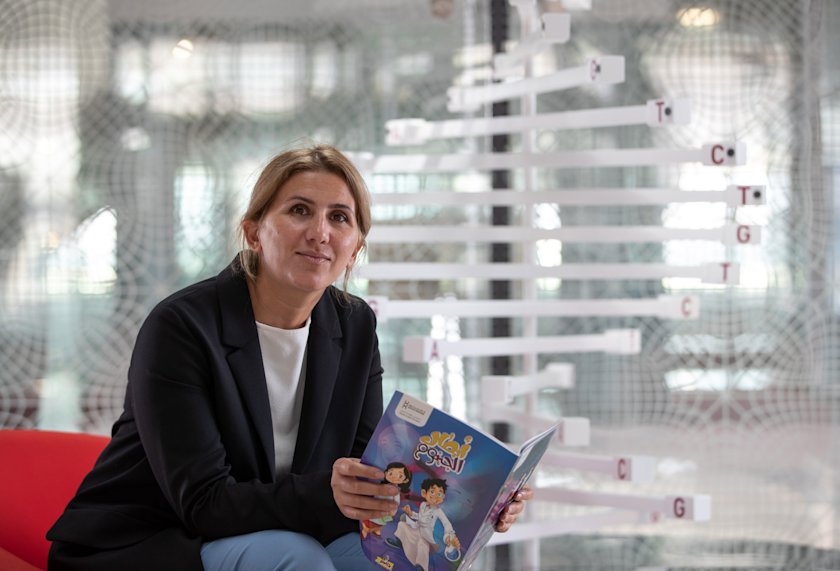
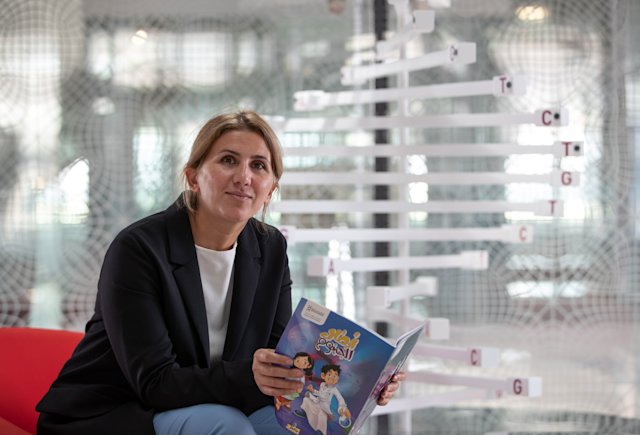
Analyzing the Impact of a Pandemic
The toll of the COVID-19 pandemic on many families has been heavy – disrupting routines, testing the balance between work and life, creating employment fears, and increasing social isolation. For others, it has actually brought them closer together.
QF member Doha International Family Institute (DIFI) studied the impact of the pandemic on the mental wellbeing of families in Qatar, and in July it unveiled its findings on the sidelines of the High-Level Political Forum on Sustainable Development, an international event focused on COVID-19 resilience and recovery.
DIFI’s studies found 64 percent of families in Qatar felt they were now more connected, with only 15 percent saying they had been negatively affected by the pandemic, while almost half said they now spent more time together. However, 28 percent believed they were now under more pressure in balancing their work and family responsibilities.
“Fostering understanding of how the COVID-19 pandemic has affected the family’s mental wellbeing, and learning from the outcomes of the unprecedented conditions this crisis has brought, is critical to creating a better future for families,” said DIFI Executive Director Dr. Sharifa Al Emadi.
The toll of the COVID-19 pandemic on many families has been heavy – disrupting routines, testing the balance between work and life, creating employment fears, and increasing social isolation. For others, it has actually brought them closer together.
QF member Doha International Family Institute (DIFI) studied the impact of the pandemic on the mental wellbeing of families in Qatar, and in July it unveiled its findings on the sidelines of the High-Level Political Forum on Sustainable Development, an international event focused on COVID-19 resilience and recovery.
DIFI’s studies found 64 percent of families in Qatar felt they were now more connected, with only 15 percent saying they had been negatively affected by the pandemic, while almost half said they now spent more time together. However, 28 percent believed they were now under more pressure in balancing their work and family responsibilities.
“Fostering understanding of how the COVID-19 pandemic has affected the family’s mental wellbeing, and learning from the outcomes of the unprecedented conditions this crisis has brought, is critical to creating a better future for families,” said DIFI Executive Director Dr. Sharifa Al Emadi.
DIFI’s study found
- 64 percent of families feel more connected since the pandemic
- Almost 50 percent of families now spend more time together
- 28 percent feel under more work-family balance pressure
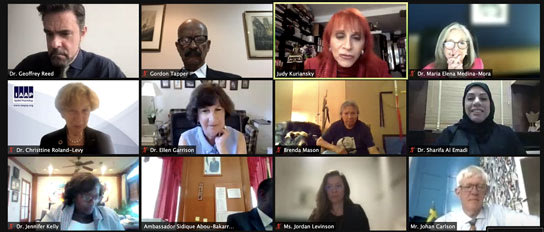

A Boost for Industry
A college of QF’s Hamad Bin Khalifa University became the first academic institution in the world to create a model that can help the hydrocarbon industry predict and maximize underground oil and gas ‘reservoirs’.
The College of Science and Engineering (CSE) developed and simulated a 1.014 billion computational cell model called QASR (Qatari Advanced Simulations for Reservoirs) that accurately mimics the flow of petroleum in the earth’s subsurface reservoirs. It forecast 15 years of production for a giant oil and gas field in just 36 hours; without a supercomputer, this would take years.
Only four simulators worldwide can perform such a task, all developed by major international companies such as ExxonMobil and Saudi Aramco. Supported by QF’s Qatar National Research Fund, QASR is the only one that exists in academia.
“The billion-cell simulation milestone is a major one for CSE, and indeed the entire scientific research community, and we are very excited at the impact it will have on the oil and gas industry,” said CSE Associate Professor Dr. Ahmad Samu Abushaikha, who headed the initiative.
A college of QF’s Hamad Bin Khalifa University became the first academic institution in the world to create a model that can help the hydrocarbon industry predict and maximize underground oil and gas ‘reservoirs’.
The College of Science and Engineering (CSE) developed and simulated a 1.014 billion computational cell model called QASR (Qatari Advanced Simulations for Reservoirs) that accurately mimics the flow of petroleum in the earth’s subsurface reservoirs. It forecast 15 years of production for a giant oil and gas field in just 36 hours; without a supercomputer, this would take years.
Only four simulators worldwide can perform such a task, all developed by major international companies such as ExxonMobil and Saudi Aramco. Supported by QF’s Qatar National Research Fund, QASR is the only one that exists in academia.
“The billion-cell simulation milestone is a major one for CSE, and indeed the entire scientific research community, and we are very excited at the impact it will have on the oil and gas industry,” said CSE Associate Professor Dr. Ahmad Samu Abushaikha, who headed the initiative.
The HBKU model forecast 15 years of oil and gas production in 36 hours
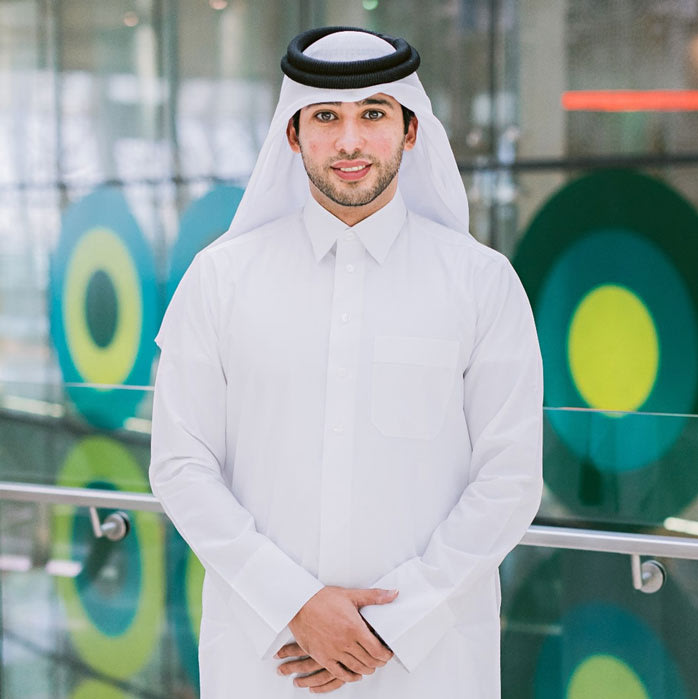
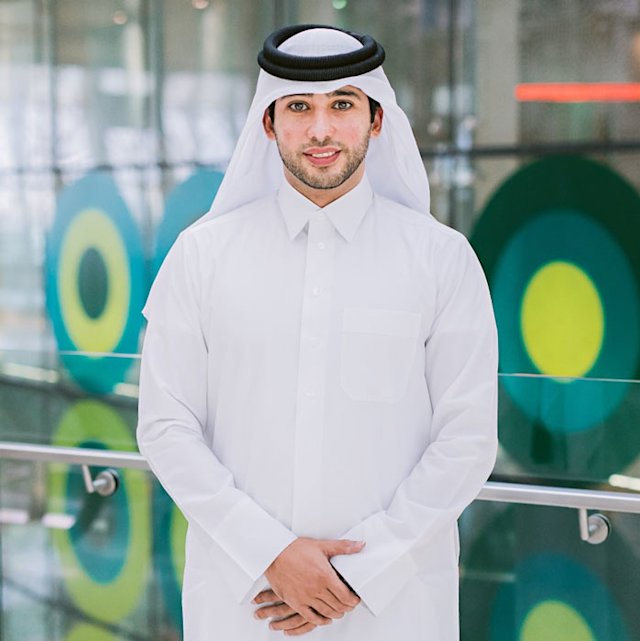
Designs on Innovation
A new innovation avenue opened up at Qatar Science & Technology Park (QSTP) – part of Qatar Foundation Research, Development and Innovation – in July, as it stepped into the world of creative arts.
The QF member teamed up with Qatar Museums’ M7 creative startup hub to boost innovation and entrepreneurship in fashion and design, broadening access to funding, investment, infrastructure, and professional support for new ventures in this sector.
“Globally, the fashion and design sectors operate at the forefront of, and contribute significantly to, technological development,” said QSTP’s Executive Director Yosouf Al-Salehi. “Prime examples of this include wearable tech, smart materials, and sustainable design, all contributing strongly to the tech economy worldwide.
“This collaboration is not only a perfect fit, but will also prove to be a platform for real value creation in the country.”
And Qatar Museums CEO Ahmad Musa Al-Namla said: “We have no doubt this partnership will go a long way toward mentoring aspiring and established creatives to realize their business ambitions.”
A new innovation avenue opened up at Qatar Science & Technology Park (QSTP) – part of Qatar Foundation Research, Development and Innovation – in July, as it stepped into the world of creative arts.
The QF member teamed up with Qatar Museums’ M7 creative startup hub to boost innovation and entrepreneurship in fashion and design, broadening access to funding, investment, infrastructure, and professional support for new ventures in this sector.
“Globally, the fashion and design sectors operate at the forefront of, and contribute significantly to, technological development,” said QSTP’s Executive Director Yosouf Al-Salehi. “Prime examples of this include wearable tech, smart materials, and sustainable design, all contributing strongly to the tech economy worldwide.
“This collaboration is not only a perfect fit, but will also prove to be a platform for real value creation in the country.”
And Qatar Museums CEO Ahmad Musa Al-Namla said: “We have no doubt this partnership will go a long way toward mentoring aspiring and established creatives to realize their business ambitions.”
QSTP has:
- Helped to commercialize 31 innovative products
- Made 115 investments in regional companies
- Incubated 20 tech-focused Qatari startups
- Become home to over 50 companies – including 20 international companies
This partnership will go a long way toward mentoring aspiring and established creatives to realize their business ambitions
Promoting Student Research
For the first time in the MENA region, student researchers were provided with an academic journal devoted to their research, thanks to QF’s Hamad Bin Khalifa University Press.
The annual QScience Connect journal, announced in July, aims to introduce graduate students to research writing and publishing, with those whose work is accepted being guided on how to develop their thesis into an article suitable for scientific publishing, expert peer review, and indexing in internationally recognized databases.
It will be published on HBKU Press’ academic Open Access platform QScience.com, with Dr. Rima Isaifan, the publishing house’s Head of Academic and Journals Publishing, saying: “By providing student researchers with a proper introduction into the world of academic publishing, not only are we enriching their learning experience, but we are providing them with the foundation to develop their future careers in academia.”
And a new science magazine led by two professors at QF partner university Northwestern University in Qatar, in collaboration with QNRF, was also launched. STEM News features stories by middle school students in Qatar that examine the country and the region’s research discoveries, helping them build their communication skills.
For the first time in the MENA region, student researchers were provided with an academic journal devoted to their research, thanks to QF’s Hamad Bin Khalifa University Press.
The annual QScience Connect journal, announced in July, aims to introduce graduate students to research writing and publishing, with those whose work is accepted being guided on how to develop their thesis into an article suitable for scientific publishing, expert peer review, and indexing in internationally recognized databases.
It will be published on HBKU Press’ academic Open Access platform QScience.com, with Dr. Rima Isaifan, the publishing house’s Head of Academic and Journals Publishing, saying: “By providing student researchers with a proper introduction into the world of academic publishing, not only are we enriching their learning experience, but we are providing them with the foundation to develop their future careers in academia.”
And a new science magazine led by two professors at QF partner university Northwestern University in Qatar, in collaboration with QNRF, was also launched. STEM News features stories by middle school students in Qatar that examine the country and the region’s research discoveries, helping them build their communication skills.
Not only are we enriching their learning experience, but we are providing them with the foundation to develop their future careers in academia
QScience.com publishes research in areas including:
- Medicine and Bioscience
- Healthcare
- Social Science
- Islamic Studies
- Engineering
Putting Wellbeing First
As Qatar baked in the extreme heat of the Gulf summer, QF was making sure that hundreds of outdoor workers at Education City were protected from the effects of soaring temperatures.
“As we reach the summer season, our Workers Welfare department began working with our contractors to organize workshops and training sessions, intensifying awareness of heat stress and precautionary measures,” said Stephen Brigg, Executive Director of QF Health, Safety and Environment.
“All Qatar Foundation contractors are expected to conduct heat stress management risk assessments, move to flexible self-monitored working hours, adjust shift rotations, enforce regular breaks, and monitor the heat index accordingly.”
QF’s efforts to safeguard workers during the summer heat includes outdoor workers being rotated to evening shifts, with daytime workers placed in ventilated, shaded areas with ample drinking water. “Wherever we can,” said Rondell Jay Boulos, QF Workers Welfare Specialist, “our guidance has been to err on the side of comfort and safety, reducing exposure to the increasing summer heat and humidity.”
As Qatar baked in the extreme heat of the Gulf summer, QF was making sure that hundreds of outdoor workers at Education City were protected from the effects of soaring temperatures.
“As we reach the summer season, our Workers Welfare department began working with our contractors to organize workshops and training sessions, intensifying awareness of heat stress and precautionary measures,” said Stephen Brigg, Executive Director of QF Health, Safety and Environment.
“All Qatar Foundation contractors are expected to conduct heat stress management risk assessments, move to flexible self-monitored working hours, adjust shift rotations, enforce regular breaks, and monitor the heat index accordingly.”
QF’s efforts to safeguard workers during the summer heat includes outdoor workers being rotated to evening shifts, with daytime workers placed in ventilated, shaded areas with ample drinking water. “Wherever we can,” said Rondell Jay Boulos, QF Workers Welfare Specialist, “our guidance has been to err on the side of comfort and safety, reducing exposure to the increasing summer heat and humidity.”
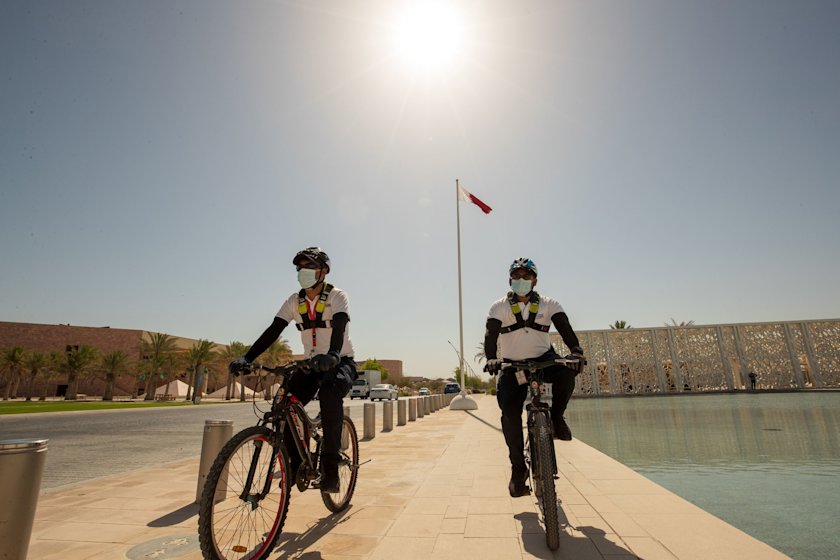
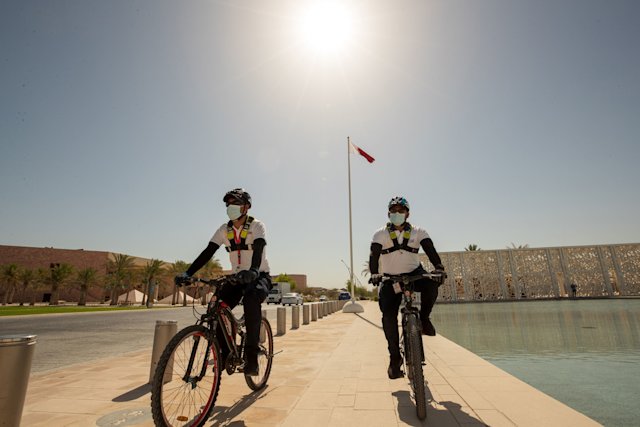
Our guidance has been to err on the side of comfort and safety, reducing exposure to the increasing summer heat and humidity